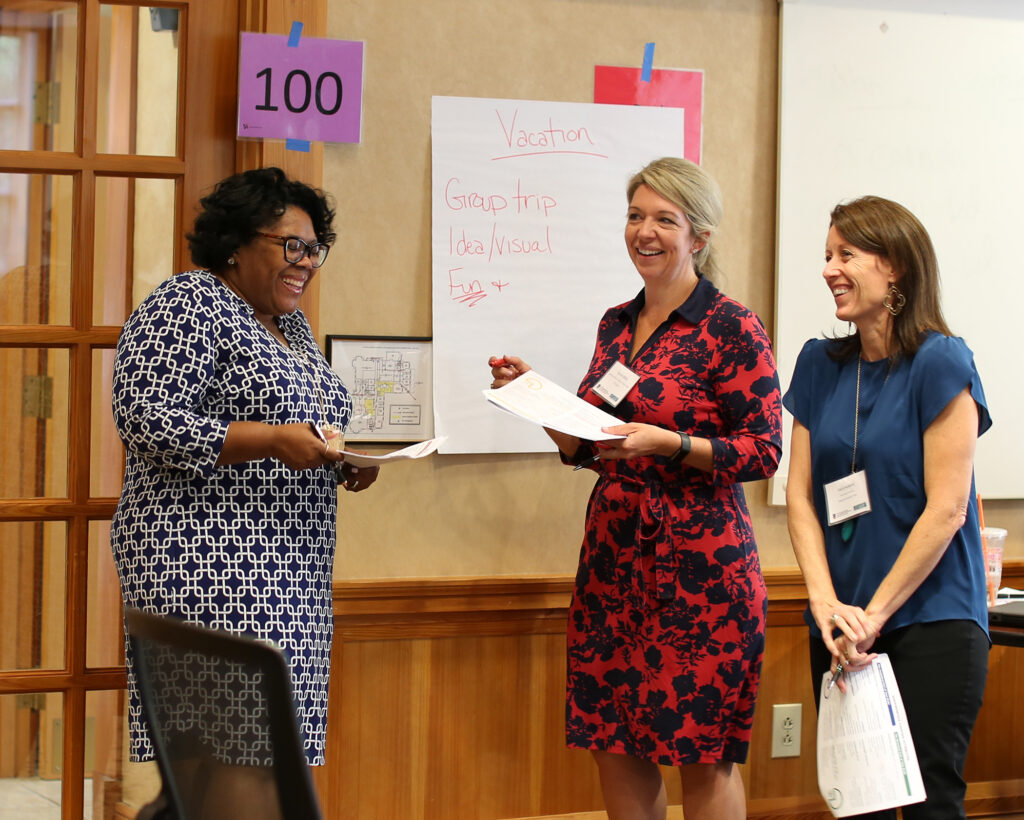A women’s leadership program developed by the University of Georgia is increasing civic engagement and leadership opportunities for women in southeast Georgia.
Since 2015, nearly 80 women from in and around Statesboro have graduated from the Lynda Brannen Williamson Women’s Leadership Academy, developed by the J.W. Fanning Institute for Leadership Development – a unit of UGA Public Service and Outreach – and data shows that those women are engaging in their communities at a higher rate.
“The academy helped me to find my voice as a leader in the community and in the workplace,” said Ava Edwards, director of alumni relations at Georgia Southern University and 2016 women’s leadership academy graduate.
The group used Emergentics to understand their thinking and behavioral processes and how to work together. (Photo by Shannah Montgomery)
In a survey, 92% of academy participants from Statesboro/Bulloch County reported voting in the 2020 general election. Of all women registered to vote in Bulloch County, only 63% voted in that election, according to the Georgia Secretary of State’s Office.
In addition, 63% of women graduating from the leadership academy report having volunteered in their community, with 40% of those volunteering at least 10 hours a week. Recent data from AmeriCorps shows that only 26.5% of Georgia residents have reported volunteering.
“Engaging civically is important for women in order to impact their communities,” said Carolina Darbisi, a senior public service associate in the UGA Fanning Institute. “Strong leadership brings all perspectives to the table and by getting involved in their communities, women are better able to ensure that they have a seat at that table.”
Not only are women in the academy getting involved in the community, they are taking on leadership roles.
More than half of the women who have graduated from the academy have taken a position on a community board, each of them in a leadership role.
“The things I learned in the academy help me better understand how I show up in different spaces and how I operate as a leader,” said Edwards. “The academy allowed me to understand how to best communicate with those I am working with whether on a board, within a nonprofit, or in a professional setting.”
During the academy, the women explore their own leadership styles and how those relate to each other; learn communication, collaboration and conflict management strategies and how to use them in group settings; and examine adaptive and multigenerational leadership strategies along with other topics like work-life balance and nonprofit board governance.
All of the content is specifically geared to a women’s perspective, said Maritza Soto Keen, a Fanning Institute senior public service associate.
“Women in leadership roles face unique challenges and the curriculum we created acknowledges that,” said Soto Keen. “The academy provides women a space to share their experiences and learn from each other.”
Five years later, Edwards still utilizes the principles and skills from the academy.
“In my current role, I spend a lot of time navigating volunteers and nonprofit boards, so I lean on the things I learned in areas like communication and board governance every single day,” said Edwards. “In fact, I still have my binder and refer to it often.”
Each class also meets with local and state leaders and “pays it forward” through a community service project. Previous community service projects have included a mentoring program for high school girls and a career day for women that offered interview training, resume development and professional makeovers.
In just five years, the academy has grown to honor the legacy of its namesake, Lynda Brannen Williamson, a Statesboro community leader who helped develop the idea for the academy before she died in 2014.
“Our original goals were to focus on servant leadership, mentorship and building a base of community servants that strengthen the community and honor the principles Lynda lived by,” said Lisa Lee, president of the Lynda Brannen Williamson Foundation. “Fanning took all of the emotions, feelings, respect and love that we had for Lynda and turned it into this incredible program.”
It is a program unlike any other, said Edwards.
“This is a first-class program that enhanced my leadership capabilities,” said Edwards. “There is not another program like it and I feel so fortunate to be a part of it.”
With financial support from Georgia Power, the Fanning Institute and the Lynda Brannen Williamson Foundation are working to expand this program into other communities in Georgia.
For more information on the Lynda Brannen Williamson Women’s Leadership Academy, click here.
